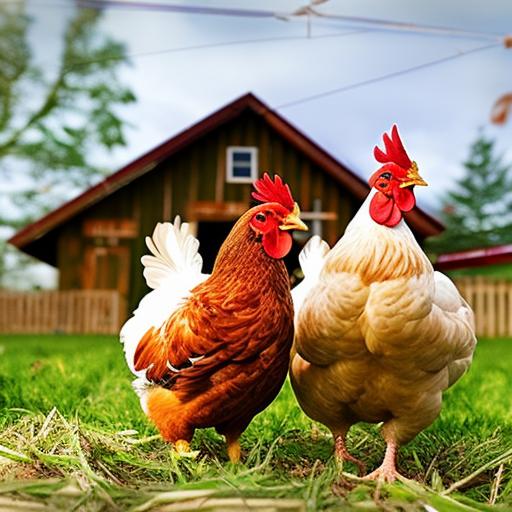Keeping chickens in a backyard coop has become a popular trend among homeowners. Not only do chickens provide fresh eggs, but they also make for a fun and rewarding hobby. However, it is important to ensure that chickens are kept healthy and happy in order to maximize their productivity and longevity. In this article, we will explore the various aspects of keeping chickens healthy in a backyard coop, including providing a clean and safe environment, choosing the right coop, maintaining proper ventilation and lighting, providing nutritious food and clean water, regular cleaning and sanitation, and preventing and treating illnesses.
Key Takeaways
- Keeping chickens healthy is important for their well-being and productivity.
- A clean and safe environment is crucial for preventing illnesses and promoting good health.
- Choosing the right chicken coop and maintaining proper ventilation and lighting are key factors in keeping chickens healthy.
- Providing nutritious food and clean water, regular cleaning and sanitation, and preventing and treating illnesses are also important for chicken health.
- By following these guidelines, you can ensure that your chickens are happy and healthy in their cozy coop.
Understanding the Importance of Keeping Chickens Healthy
Keeping chickens healthy is crucial for several reasons. Firstly, it helps prevent the spread of diseases among the flock. Chickens are susceptible to various illnesses, such as avian influenza and salmonella, which can not only affect their health but also pose a risk to humans. By maintaining good hygiene practices and monitoring the health of the chickens, you can minimize the risk of disease transmission.
Secondly, keeping chickens healthy ensures that they live a long and happy life. Just like any other living creature, chickens deserve to be treated with care and provided with a suitable environment. By meeting their basic needs and addressing any health concerns promptly, you can ensure that your chickens thrive and enjoy a good quality of life.
Providing a Clean and Safe Environment
One of the most important aspects of keeping chickens healthy is providing them with a clean and safe environment. A dirty or hazardous coop can lead to various health issues for the chickens. It is essential to regularly clean the coop and remove any waste or debris that may accumulate.
To maintain a clean environment, use natural cleaning products that are safe for both the chickens and the environment. Avoid using harsh chemicals or pesticides that could harm the chickens or contaminate their food or water sources.
In addition to cleanliness, it is crucial to ensure that the coop is secure and free of hazards. Check for any sharp objects or potential predators that could harm the chickens. Install sturdy fencing and locks to keep out predators, and regularly inspect the coop for any signs of damage or wear.
Choosing the Right Chicken Coop
Choosing the right chicken coop is essential for the health and well-being of your chickens. The coop should be the right size and design to accommodate the number of chickens you plan to keep. Overcrowding can lead to stress, aggression, and the spread of diseases.
Consider the climate in your area when selecting a coop. Chickens are sensitive to extreme temperatures, so it is important to choose a coop that provides adequate insulation and ventilation. A coop with windows or vents can help regulate the temperature and prevent the buildup of harmful gases.
Maintaining Proper Ventilation
Proper ventilation is crucial for maintaining a healthy environment in the chicken coop. Good ventilation helps remove excess moisture, ammonia, and other harmful gases that can build up in a confined space. It also helps regulate the temperature inside the coop, preventing it from becoming too hot or too cold.
To maintain proper ventilation, ensure that the coop has enough windows or vents to allow for air circulation. Consider installing adjustable vents that can be opened or closed depending on the weather conditions. Regularly check for any blockages or obstructions that may hinder airflow.
Ensuring Adequate Lighting

Adequate lighting is important for chickens as it helps regulate their sleep patterns and egg production. Chickens require a certain amount of light each day to maintain their circadian rhythm and lay eggs consistently.
Provide natural light sources in the coop whenever possible. If natural light is not sufficient, consider using artificial lighting with a timer to ensure that chickens receive the appropriate amount of light each day. Be mindful of providing a balance between light and darkness to mimic natural daylight cycles.
Providing Nutritious Food and Clean Water
Proper nutrition is essential for the health and productivity of chickens. A balanced diet that includes a variety of grains, proteins, vitamins, and minerals is necessary to meet their nutritional needs. Consult with a poultry nutritionist or veterinarian to determine the best feed for your chickens based on their age, breed, and purpose.
In addition to providing nutritious food, it is important to ensure that chickens have access to clean and fresh water at all times. Use a waterer with a filter to prevent contamination and regularly clean and refill the water source to maintain its cleanliness.
Regular Cleaning and Sanitation
Regular cleaning and sanitation are crucial for maintaining a healthy environment in the chicken coop. Remove any waste or debris from the coop on a daily basis to prevent the buildup of harmful bacteria or parasites. Use a natural disinfectant to clean the coop periodically, paying special attention to areas where bacteria may accumulate, such as nesting boxes and perches.
It is also important to regularly clean the surrounding area of the coop, including the yard or run where the chickens have access. Remove any fallen leaves or debris that may attract pests or harbor bacteria. Consider using organic pest control methods to prevent infestations without harming the chickens or the environment.
Preventing and Treating Illnesses
Chickens are susceptible to various illnesses, so it is important to take preventive measures to keep them healthy. Quarantine new chickens before introducing them to the existing flock to prevent the spread of diseases. Monitor the behavior and appearance of the chickens regularly and seek veterinary care if you notice any signs of illness.
Common illnesses in chickens include respiratory infections, parasites, and egg-related issues. Consult with a veterinarian who specializes in poultry health for guidance on preventing and treating these illnesses. Follow their recommendations for vaccinations, deworming, and other preventive measures.
Happy and Healthy Chickens in a Cozy Coop
Keeping chickens healthy and happy in a backyard coop requires attention to various aspects, including providing a clean and safe environment, choosing the right coop, maintaining proper ventilation and lighting, providing nutritious food and clean water, regular cleaning and sanitation, and preventing and treating illnesses. By following these tips and guidelines, you can ensure that your chickens live a long, happy life in a cozy coop. Remember to prioritize their well-being and address any health concerns promptly to maximize their productivity and enjoyment.
If you’re looking for the best way to keep your chickens healthy, you’ll want to check out this informative article on the Poultry Wizard website. They provide valuable insights and tips on maintaining a healthy environment for your feathered friends. One related article that caught my attention is their guide on creating a garden chicken coop, which can offer numerous benefits for both your chickens and your garden. To learn more about this innovative approach to chicken keeping, click here.
FAQs
What are some common health problems that chickens face?
Some common health problems that chickens face include respiratory infections, mites and lice infestations, egg-laying issues, and digestive problems.
What is the best way to prevent health problems in chickens?
The best way to prevent health problems in chickens is to provide them with a clean and dry living environment, a balanced diet, and access to clean water. Regular health checks and vaccinations can also help prevent diseases.
What should I feed my chickens to keep them healthy?
Chickens require a balanced diet that includes protein, carbohydrates, fats, vitamins, and minerals. A diet that includes a mix of grains, vegetables, fruits, and protein sources such as insects, worms, or meat scraps can help keep chickens healthy.
How often should I clean my chicken coop?
It is recommended to clean your chicken coop at least once a week. This includes removing any soiled bedding, scrubbing the coop with a disinfectant, and replacing the bedding with fresh material.
What are some signs that my chickens may be sick?
Some signs that your chickens may be sick include lethargy, loss of appetite, weight loss, diarrhea, abnormal breathing, and changes in egg production. It is important to monitor your chickens regularly and seek veterinary care if you notice any concerning symptoms.
Can I use natural remedies to treat my chickens?
Yes, there are many natural remedies that can be used to treat common health problems in chickens. These include herbal supplements, essential oils, and probiotics. However, it is important to consult with a veterinarian before using any natural remedies to ensure they are safe and effective.
Meet Walter, the feathered-friend fanatic of Florida! Nestled in the sunshine state, Walter struts through life with his feathered companions, clucking his way to happiness. With a coop that’s fancier than a five-star hotel, he’s the Don Juan of the chicken world. When he’s not teaching his hens to do the cha-cha, you’ll find him in a heated debate with his prized rooster, Sir Clucks-a-Lot. Walter’s poultry passion is no yolk; he’s the sunny-side-up guy you never knew you needed in your flock of friends!







